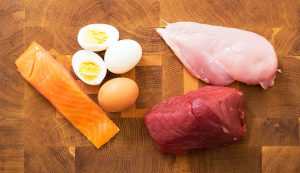
Although dieticians and health experts stress the importance of meeting your daily protein target, many people start taking it a tad too seriously. Walk into any health food store or open any sports magazine and you will be bombarded with all kinds of protein supplements: bars, drinks, powders, you name it. So, the question is, do you really need that much protein?
How much protein do you need?
About ten to thirty-five percent of your calories should come from protein, depending on your weight, age, and lifestyle (especially your activity level). An average adult weighing 165 lbs. with minimal physical activity needs about 60g of protein a day. This translates into a dietary allowance of 0.36g of protein per pound of weight. Of course, the more you move (and burn energy), the more protein you need. If you exercise regularly, you should aim for about 0.5–0.7g per pound. If you’re overweight, it’s best to consult with a dietician who can calculate the right target for you.
While it may seem like everybody is protein-deficient (hence aggressive promotion of protein supplementation), in reality, many people eat too much protein. If you’re a true carnivore and can’t imagine any of your meals without a good chunk of meat, chances are, your protein intake is excessive. Studies have shown that eating more protein than the recommended 15–20 grams at a time doesn’t benefit your body, while overconsumption of protein is taxing on the kidneys and can raise your level of blood lipids.
Muscle loss is a common concern among the aging population. Unfortunately, as we age, our body cannot build muscles as effectively. Years of physical inactivity add up, contributing to muscle wasting. This is a cause for concern because our muscles support our body and keep it strong, but as you lose your muscle mass, you become weaker and more susceptible to falls and injuries. (Is your lifestyle contributing to muscle loss?)
Yes, it makes sense to amp up your protein intake as you age to prevent muscle loss. In fact, once you pass the age of 50, your protein needs increase—but be careful here. Sufficient protein intake should go hand in hand with exercise in order to translate into muscle growth. Exercise is what makes your body make effective use of all the protein you’re feeding it. If you don’t use up your calories, any excess will be stored in form of fat—you don’t want that.
Getting your protein needs met
Here are a few pointers to help you meet your daily protein needs without overdoing it:
- Don’t try to get all your protein from a single meal. Instead, spread out your protein consumption throughout the day.
- Including some protein into your breakfast will help manage your weight and avoid cravings.
- Protein is a part of the meal, not the meal itself. Pair your protein with fruits, vegetables, and whole grains.
- The healthiest protein sources include plant sources (soy, nuts, pulses), lean meats, fish, egg whites, and low-fat dairy.
As you can see, getting enough protein is not as difficult as it sounds. As you make an effort to diversify your meals and add exercise into your daily routine, you will enjoy the result of a wholesome, well-balanced diet and a strong body you can rely on in old age.
Related: How to stock up on protein if you don’t eat meat